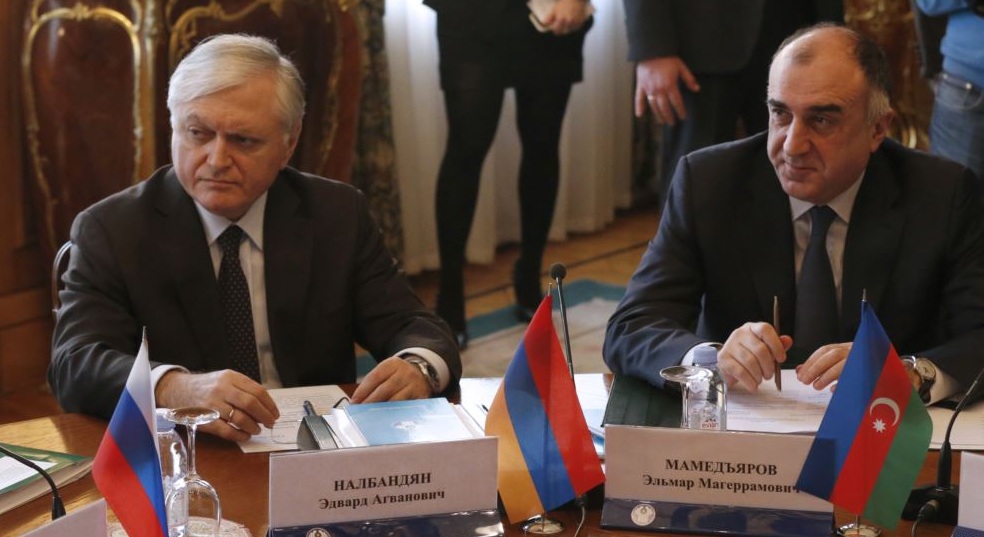The Nagorno-Karabakh conflict will once more come into focus as officials from two neighboring countries Azerbaijan and Armenia meet next month in Vienna to seek an end to what has been lasting for more than two decades. The foreign ministers of Azerbaijan and Armenia will meet on the sidelines of a ministerial meeting of the Organization for Security and Cooperation (OSCE).
“The Ministers agreed to hold a joint meeting on the margins of the December 2017 OSCE Ministerial Council in Vienna,” Co-Chairs of the OSCE Minsk Group announced in a joint statement issued by the OSCE on November 16.
“The Co-Chairs will prepare the agenda for this meeting, which will include substantive issues of the political settlement, as well as specific measures to reduce tensions on the Line of Contact.
The announcement came after separate meetings were held between the foreign ministers of Armenia and Azerbaijan with the three Co-Chairs of the OSCE Minsk Group, namely Igor Popov from Russia, Stephane Visconti from France and Andrew Schofer from the U.S., as well as the Personal Representative of the OSCE Chairperson-in-Office Andrzej Kasprzyk.
On November 14 in Moscow the officials exchanged views with Armenia’s Edward Nalbandyan about the implementation of agreements reached by the presidents of Azerbaijan and Armenia on October 16 in Geneva. Two days later, the same issues were on the agenda as the officials met with Azerbaijan’s Foreign Minister Elmar Mammadyarov.
In the meetings in Geneva, as well as in Vienna and Saint Petersburg in May and June 2016, respectively, Azerbaijan’s President Ilham Aliyev and his Armenian counterpart Serzh Sargsyan focused on preventing tensions on the Line of Contact and creating the grounds necessary for peacefully resolving the conflict.
"I was very pleased with the content of the negotiations with the OSCE Minsk Group Co-Chairs. Negotiations were quite constructive. We have discussed issues pertaining to the settlement of the Armenia-Azerbaijan conflict," Mammadyarov said following his meeting in Moscow, according to a news report by Azertag.
“Today, the Co-Chairs have come to work very seriously. They said we were not tourists [and] they need serious negotiations because they represent serious countries. I welcome it,” Mammadyarov said.
The last time the two ministers met was in Brussels on July 11, when Mammadyarov called for a complete withdrawal of Armenian forces from occupied Azerbaijani lands in line with the four UN Security Council resolutions that were passed in 1993, but never fulfilled.
In a meeting with Aliyev in Baku on November 19, Russia’s Foreign Minister Sergey Lavrov highlighted Moscow’s role in resolving the Nagorno-Karabakh conflict.
“We, as a member of the trio of OSCE Minsk Group co-chair states, are interested in helping you in every possible way to seek solutions and ensure progress towards settlement of the Nagorno-Karabakh conflict,” Lavrov told Aliyev, according to a statement posted to the President of Azerbaijan’s official website, President.Az. “We absolutely agree with you that we need to make active efforts in this direction,” Lavrov said.
The two South Caucasus neighbors Armenia and Azerbaijan became enemies during the dying days of the Soviet Union. In the early 1990s, after the USSR officially collapsed, Armenia kicked off a military campaign to take control over Azerbaijan’s Nagorno-Karabakh region, which is an integral part of Azerbaijan’s sovereign and internationally recognized territory.
The two countries went to war between 1992 and 1994, which resulted in Armenia fully occupying Azerbaijan’s Nagorno-Karabakh region and seven surrounding districts. By the time a ceasefire went into effect in 1994, more than 20,000 Azerbaijanis had been killed and over one million people displaced. In addition, 4,000 citizens were taken captive, held hostage, or went missing.
The Organization for Security and Co-operation in Europe (OSCE) jumped in the peace-seeking process in 1994 with creating the Minsk Group that is mandated to mediate in the efforts for finding a peaceful solution to the Nagorno-Karabakh conflict. Even so, the conflict is far from over.







 Armenian sappers commenced on Monday mine-clearance operations in the territories adjacent to the Saint Mary Church in village of Voskepar (Armenia...
Armenian sappers commenced on Monday mine-clearance operations in the territories adjacent to the Saint Mary Church in village of Voskepar (Armenia...
 Iran and Pakistan have signed eight cooperation documents in various fields, and agreed to strengthen ties to fight terrorism in the region.
Iran and Pakistan have signed eight cooperation documents in various fields, and agreed to strengthen ties to fight terrorism in the region.
 As the conflict between Ukraine and Russia escalates, the strategic importance of Kharkiv, Ukraine's second-largest city, has come sharply into focus.
As the conflict between Ukraine and Russia escalates, the strategic importance of Kharkiv, Ukraine's second-largest city, has come sharply into focus.



